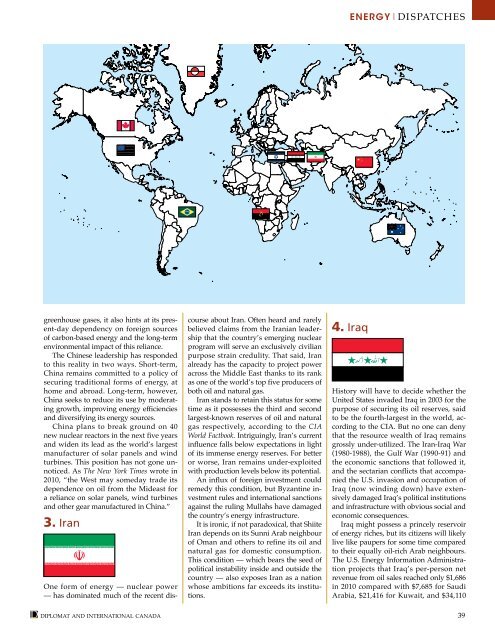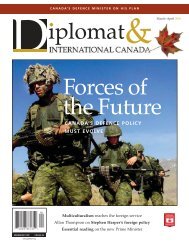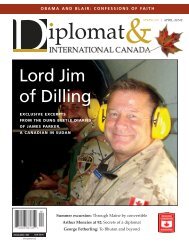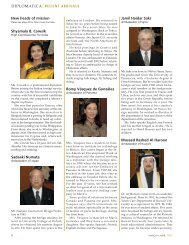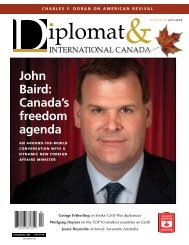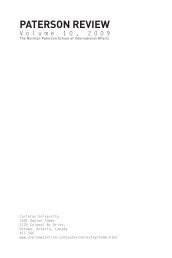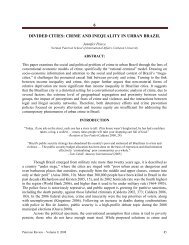the new petro power paradigm - Diplomat Magazine
the new petro power paradigm - Diplomat Magazine
the new petro power paradigm - Diplomat Magazine
Create successful ePaper yourself
Turn your PDF publications into a flip-book with our unique Google optimized e-Paper software.
ENERGY|Di spatches<br />
greenhouse gases, it also hints at its present-day<br />
dependency on foreign sources<br />
of carbon-based energy and <strong>the</strong> long-term<br />
environmental impact of this reliance.<br />
The Chinese leadership has responded<br />
to this reality in two ways. Short-term,<br />
China remains committed to a policy of<br />
securing traditional forms of energy, at<br />
home and abroad. Long-term, however,<br />
China seeks to reduce its use by moderating<br />
growth, improving energy efficiencies<br />
and diversifying its energy sources.<br />
China plans to break ground on 40<br />
<strong>new</strong> nuclear reactors in <strong>the</strong> next five years<br />
and widen its lead as <strong>the</strong> world’s largest<br />
manufacturer of solar panels and wind<br />
turbines. This position has not gone unnoticed.<br />
As The New York Times wrote in<br />
2010, “<strong>the</strong> West may someday trade its<br />
dependence on oil from <strong>the</strong> Mideast for<br />
a reliance on solar panels, wind turbines<br />
and o<strong>the</strong>r gear manufactured in China.”<br />
3. Iran<br />
One form of energy — nuclear <strong>power</strong><br />
— has dominated much of <strong>the</strong> recent discourse<br />
about Iran. Often heard and rarely<br />
believed claims from <strong>the</strong> Iranian leadership<br />
that <strong>the</strong> country’s emerging nuclear<br />
program will serve an exclusively civilian<br />
purpose strain credulity. That said, Iran<br />
already has <strong>the</strong> capacity to project <strong>power</strong><br />
across <strong>the</strong> Middle East thanks to its rank<br />
as one of <strong>the</strong> world’s top five producers of<br />
both oil and natural gas.<br />
Iran stands to retain this status for some<br />
time as it possesses <strong>the</strong> third and second<br />
largest-known reserves of oil and natural<br />
gas respectively, according to <strong>the</strong> CIA<br />
World Factbook. Intriguingly, Iran’s current<br />
influence falls below expectations in light<br />
of its immense energy reserves. For better<br />
or worse, Iran remains under-exploited<br />
with production levels below its potential.<br />
An influx of foreign investment could<br />
remedy this condition, but Byzantine investment<br />
rules and international sanctions<br />
against <strong>the</strong> ruling Mullahs have damaged<br />
<strong>the</strong> country’s energy infrastructure.<br />
It is ironic, if not paradoxical, that Shiite<br />
Iran depends on its Sunni Arab neighbour<br />
of Oman and o<strong>the</strong>rs to refine its oil and<br />
natural gas for domestic consumption.<br />
This condition — which bears <strong>the</strong> seed of<br />
political instability inside and outside <strong>the</strong><br />
country — also exposes Iran as a nation<br />
whose ambitions far exceeds its institutions.<br />
4. Iraq<br />
History will have to decide whe<strong>the</strong>r <strong>the</strong><br />
United States invaded Iraq in 2003 for <strong>the</strong><br />
purpose of securing its oil reserves, said<br />
to be <strong>the</strong> fourth-largest in <strong>the</strong> world, according<br />
to <strong>the</strong> CIA. But no one can deny<br />
that <strong>the</strong> resource wealth of Iraq remains<br />
grossly under-utilized. The Iran-Iraq War<br />
(1980-1988), <strong>the</strong> Gulf War (1990-91) and<br />
<strong>the</strong> economic sanctions that followed it,<br />
and <strong>the</strong> sectarian conflicts that accompanied<br />
<strong>the</strong> U.S. invasion and occupation of<br />
Iraq (now winding down) have extensively<br />
damaged Iraq’s political institutions<br />
and infrastructure with obvious social and<br />
economic consequences.<br />
Iraq might possess a princely reservoir<br />
of energy riches, but its citizens will likely<br />
live like paupers for some time compared<br />
to <strong>the</strong>ir equally oil-rich Arab neighbours.<br />
The U.S. Energy Information Administration<br />
projects that Iraq’s per-person net<br />
revenue from oil sales reached only $1,686<br />
in 2010 compared with $7,685 for Saudi<br />
Arabia, $21,416 for Kuwait, and $34,110<br />
diplomat and international canada 39


